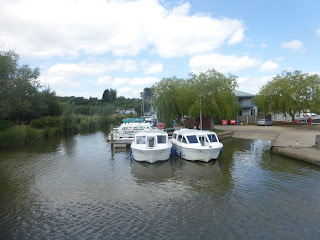Two friends of mine who also happen to be writers I admire have published new novels recently. It goes without saying that I recommend their work, but I thought that today I'd discuss how apparently very different approaches to writing can result in equally harmonious results. I've touched on this subject before, and I was reminded of it when conducting a recent online crime writing workshop in collaboration with another pair of interesting writers, Lucinda Hawksley and David Mark.
Ann Cleeves' The Rising Tide is the latest Vera Stanhope mystery. I had the pleasure - and it really was a pleasure - of discussing the book with Ann in conversation at a theatre in Carlisle a few weeks ago. Ann is a very consistent writer, but I think it's fair to say that this is probably my favourite among her recent books. It combines a wonderful setting (Lindisfarne) with a good mystery and interesting characterisation.
Ann has often said that she doesn't plot her books in advance. At Carlisle, she mentioned that she originally had a different starting point for the story. But her experience and skill enable her to weave various pieces of material into a pleasing pattern. We're introduced to the characters before murder strikes, and then after the investigation begins, another tragedy occurs. The closing pages, as ever, see at least one character in peril, and in this book the jeopardy is handled at least as effectively as in any of Ann's earlier bestsellers. The result is powerful.
Kate Ellis's Serpent's Point is also an entry in a long series, this time featuring Wesley Peterson. Again the setting (in Devon) is a valuable ingredient. Kate does plot her books - very meticulously - but like Ann she manages to come up with a pattern of writing, in her case a blend of a historical mystery and a contemporary crime, which is harmonious and appealing to a large number of readers. I don't want to say too much about the detail of either story, but here I was especially taken with the premise of the victim, Susan, undertaking a do-it-yourself crime investigation. Brave or foolish of her? Well, you'll have to read the book to find out...



















































